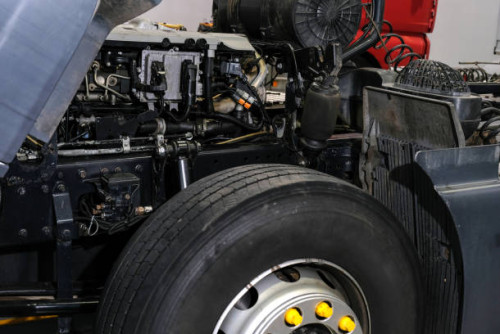Diesel Technology AS Degree
Associate in Science | SC Program: AS.1175
This curriculum prepares the student for entry into the mechanic trade related to heavy equipment and diesel engines. Award of apprenticeship credit for completion of the program will depend on the employer, local union regulations, aptitude of student, as well as the curriculum completed. The Diesel Technology major requires technical courses to satisfy the minimum requirements for the major. Students are encouraged to take as many technical courses and related electives as their program will permit. When necessary, auto mechanic courses and diesel courses may be interchanged to satisfy major requirements.
This degree is approved through the California Community College Chancellor’s Office. Upon satisfactory completion of all degree requirements and filing an application for graduation with Admissions and Records, the student’s transcript will reflect completion of this degree.



Choose your path
Map your education by viewing the program map for the degree or certificate you’re interested in earning below. Meet with a counselor to create your official comprehensive education plan.
A program map shows all the required and recommended courses you need to graduate and a suggested order in which you should take them. The suggested sequence of courses is based on enrollment and includes all major and general education courses required for the degree.
Fall Semester, First Year
16.5 Units TotalIn this course, students receive instruction in academic reading and writing, including writing processes, effective use of language, analytical thinking, and the foundations of academic research. An argumentative research essay is required for the successful completion of the course. This course may be offered in a distance education format.
Spring Semester, First Year
16 Units TotalThis course is designed to equip Career Technical Education students with college-level mathematical competencies required in today's workplace. Topics include college-level algebra, measurement units and conversion, estimation, solid figures, geometry, trigonometry, basic statistics, and probability. This course will promote quantitative reasoning through the use of mathematical applications and modeling with an emphasis on CTE topics. These applications and modeling will be reinforced by using requisite tools utilized by CTE courses to enhance students' visualization and problem-solving development.
This course takes an interdisciplinary approach to the study of race and ethnicity in the United States. It examines social justice movements in relation to ethnic and racial groups in the United States to provide a basis for a better understanding of the socioeconomic, cultural, and political conditions among key social groups including, but not limited to, Native Americans, African Americans, Asian Americans, and Latina/o Americans. This course examines the systemic nature of racial/ethnic oppression through an examination of key concepts including racialization and ethnocentrism, with a specific focus on the persistence of white supremacy. Using an anti-racist framework, the course will examine historical and contemporary social movements dedicated to the decolonization of social institutions, resistance, and social justice. This course may be offered in a distance education format.
The Diesel Technology Work Experience Education course allows the student to gain on-the-job experience through employment/volunteerism at an approved diesel technology job site that is acquired by the student and related to the student's major. A faculty member supervises all WEE courses to ensure that the work experience is of educational value. The course stresses good work habits and meeting of competencies through actual on-the-job performance. A student may repeat this course since course content varies and skills are enhanced by supervised repetition and practice. A maximum of 14 units may be earned in a single semester.
Fall Semester, Second Year
16 Units TotalThis course is an introduction to the integrated management of forests, soil, watershed, fish, and wildlife in the context of protection and restoration of watersheds and ecosystems. An emphasis will be placed on natural resources careers, policy and law, tools, techniques and practices, and management philosophies of public and private lands. Basic biological and ecological processes will be introduced along with discussion of the scientific method and preparing reports. This course may be offered in a distance education format.
This is an introductory course designed for the student interested in acquiring basic welding skills to be used in a trade or service occupation. Emphasis is placed on current welding, cutting, and forming processes. A portion of this course may be offered in a distance education format.
Spring Semester, Second Year
12 Units TotalThis course is a comparative survey of the major ancient world civilizations which developed between 3500 B.C.E. and 1500 C.E. It examines political institutions, religious ideologies, the rise and fall of empires, and the major cultural innovations of each of the major world civilizations. This course may be offered in a distance education format.
Please see a counselor to discuss options for meeting general education requirements for transfer to California State Universities (CSU) and/or University of California (UC) campuses, as well as any specific additional courses that may be required by your chosen institution of transfer.
*Alternative Courses: Please see a Shasta College counselor for alternative course options. You can also view the following to find other courses to meet degree/certificate requirements:
- California State Universities – General Education
- IGETC – Intersegmental General Education Transfer Curriculum
Contact Us for More Information
Counseling & Student Services
Contact InfoAcademic/Instructional Division Office
Start Your Future at Shasta College
We are dedicated to helping you reach your educational and career goals. To begin your journey, apply for admissions today!
